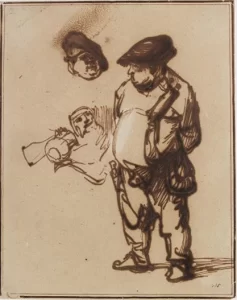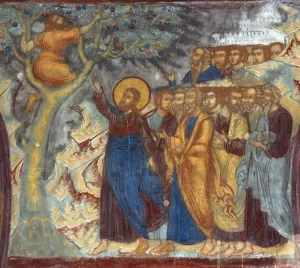Words on the Word
31. Sunday C
Wisdom 11:22-12:2: You are merciful to all, because you can do all things.
2 Thessalonians 1:11-2:2: We pray that our God will make you worthy of his call.
Luke 19:1-10: Zacchaeus, come down!
We have heard a passage from the Gospel according to Luke, a versatile fellow. His texts are better crafted than any others in the New Testament: his literary gifts are evident. From Paul we know he was a doctor, a profession which in those days was still based on touch — his hands will have been his primary tools. In addition, tradition tells us that Luke painted. The first icon of the Mother of God is said to be the work of his hands. It doesn’t happen often than one person possesses three so specialised kinds of competence: knowledge of human physiognomy in health and sickness; the ability to create verisimilar portraits; and an ability to formulate in words what he observes and paints.
Luke, we have to say, was the perfect evangelist.

His sketches, indeed, are marked by a rare vibrancy. He is a Rembrandt of writing. We owe him, and him only, what we know of the prodigal son, the good Samaritan, the wanderers to Emmaus — and Zacchaeus, naturally. The story about him is brief, limited to ten verses in our Bible. That was all Luke needed to draw a sketch in sufficient detail to let us feel that we know the man, a sketch that has left its mark on an entire civilisation. That is how we recognise a masterpiece.
We are told four things explicitly about Zacchaeus: that he was, not just a tax collectors, but a leader of the guild of tax collectors; that he was very rich; that he was very short; and that he wanted to see Jesus.
Luke lets us discern a few more things between the lines. If Zacchaeus was so wealthy, so influential, couldn’t he have elbowed his way to the front of the queue? Sure he could. But the position would have come at a price. He would, he realised, have exposed himself to the sarcasm of the crowd, which is perennially terrible. His shortness of stature invited ridicule. In addition he was, in the melée, surrounded by enemies. Remember: he collected taxes for the foreign occupiers.
Jericho was a small town with some 3000 inhabitants. All would have known who Zacchaeus was, where his money came from. Many would gladly have contributed a banana peel for him to slip on while they were waiting listlessly for the arrival of the Prince of Peace. Zacchaeus realised this. Instead of letting others make a fool of him, he himself did something perfectly absurd. He, a grown man, climbed up into a sycamore tree. The image of him there, on his own, confirms how lonely he must have felt among the villagers.
I’m not going to stand here, 2000 years on, and psychoanalyse Zacchaeus. I lack both the inclination and the competence. Still, Luke himself, the knowing portraitist, invites the question: Was is Zaccaheus’s shortness, his visible otherness (a source, perhaps, of shame) that had made him seek a marginal situation in the community?
Had he been taunted as a child, say, he would as a Roman official have had the satisfaction of wielding power over the mob. He would have had his comeuppance. If Jericho had made him a loner, why shouldn’t he have claimed that status for himself, as if to say: ‘You haven’t sidelined me, I’m sidelining you!’ That is the signal Zaccaheus sends, it seems to me, up there in his sycamore tree. We can almost see him grimacing at the crowd.
I dare say many of us can recognise ourselves in him there. What are we not prepared to do to hide our vulnerability? The mere thought that someone might publicly point to an aspect of ourselves that we’re ashamed of seems to us a fate worse than death. To resist it, we are ready for anything, even violence, be it towards ourselves. Often, very often, the source of sin in people’s lives is a near-panic fear of being humiliated.
Into this tension rich in circulating thoughts and exchanged dark glances the call resounds: ‘Zacchaeus, come down!’ The Prince of Peace is there. People had almost forgotten about him on account of all the hubbub surrounding Zacchaeus. Still, even if they didn’t see him come, he, the Logos of God, saw them, and with perfect clarity. He saw who needed him most; and he saw what gesture was required to cut through the knot that held a community arrested in mutual disdain. ‘I must stay at your house today.’ The crowd was furious. We can see why: Should the Anointed of God seek his lodgings in the house of a public sinner? Yes, he should; not to approve or confirm sin, but to heal it. 
The notion of the healing of sin is essential. It is specifically Christian. We easily forget it, however, and think of sin just in terms of crime and punishment. These terms have their contribution to make, by all means, but they are not sufficient. In a Christian perspective, sin cannot be reduced to transgression; sin is likewise an inherited latent infection which we carry. Are we to make headway in the following of Christ, we must first of all let ourselves be healed.
Luke makes this crystal clear. He was, after all, a physician in addition to being able to paint splendidly both with oils and with words. The medicine Zacchaeus needed was a lucid gaze placed serenely upon him, saying: ‘I can see everything you carry, but I do not despise you; I esteem you for what you have it in you to become.’ At once, the chains that had held Zacchaeus bound for a lifetime were reduced to dust. He stood there freed, unafraid, endowed, suddenly, with great dignity.
In this Mass, Bothers and Sisters, the Lords Jesus looks on each one of us the way he looked on Zacchaeus. As we have just read in the Book of Wisdom: He holds nothing of what he has made in abhorrence. He holds none of us in abhorrence, no matter what luggage we bear. But he asks us: ‘Do you want to be healed?’ In a moment, before Holy Communion, we will pray together: ‘Only say the word, and my soul shall be healed.’ Let us make that prayer with an undivided soul. And the Lord will give us his Word, in the form of Nourishment for eternal life. Amen.
